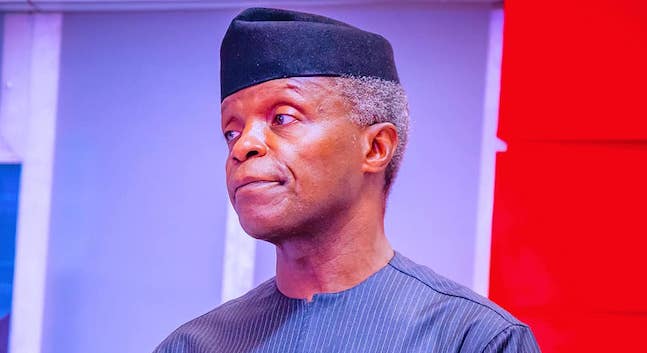News
Osinbajo proposes debt-for-climate swap deal at US lecture

Vice President Yemi Osinbajo on Friday proposed a Debt-For-Climate Swap deal in order to ensure a just energy transition for countries in Africa.
Osinbajo, according to a statement issued by his Senior Special Assistant on Media and Publicity, Laolu Akande, stated this at a lecture on a just and equitable energy transition for Africa at the Center for Global Development in Washington D.C, United States.
He said: “Debt for climate swaps is a type of debt swap where bilateral or multilateral debt is forgiven by creditors in exchange for a commitment by the debtor to use the outstanding debt service payments for national climate action programmes.
“Typically, the creditor country or institution agrees to forgive part of a debt, if the debtor country would pay the avoided debt service payment in a local currency into an escrow or any other transparent fund and the funds must then be used for agreed climate projects in the debtor country.
“Increase the fiscal space for climate-related investments and reduce the debt burden for participating developing countries.
“For the creditor, the swap can be made to count as a component of their Nationally Determined Contributions (NDC).”
The Vice President called for significant policy actions to make the deal acceptable and sustainable.
He also proposed the greater participation of African countries in the Global Carbon Market.
READ ALSO: Osinbajo departs Nigeria to seek global support of Energy Transition Plan
Osinbajo added: “In addition to conventional capital flows both from public and private sources, it is also essential that Africa can participate more fully in the global carbon finance market.
“Currently, direct carbon pricing systems through carbon taxes have largely been concentrated in high and middle-income countries.
“However, carbon markets can play a significant role in catalysing sustainable energy deployment by directing private capital into climate action, improving global energy security, providing diversified incentive structures, especially in developing countries, and providing an impetus for clean energy markets when the price economics looks less compelling – as is the case today.”
He encouraged developed countries to support Africa to develop into a global supplier of carbon credits, including bio-diversity and energy-based credits.
Members of the Energy Transition Implementation Working Group (ETWG) present at the lecture were the Minister of Works and Housing, Babatunde Fashola, Minister of Finance, Budget and National Planning, Zainab Ahmed, and her Environment counterpart, Mohammed Abdullahi.
Others were the Director-General of the National Council on Climate Change, Salisu Dahiru, Nigeria’s Ambassador to the US, Uzoma Emenike, Special Representative of the United Nations Secretary-General for Sustainable Energy for All (SEforALL), Ms. Damilola Ogunbiyi.
The Managing Director of Niger Delta Power Holding Company Limited, Chiedu Ugbo, and other senior government officials were also at the lecture.
Join the conversation
Support Ripples Nigeria, hold up solutions journalism
Balanced, fearless journalism driven by data comes at huge financial costs.
As a media platform, we hold leadership accountable and will not trade the right to press freedom and free speech for a piece of cake.
If you like what we do, and are ready to uphold solutions journalism, kindly donate to the Ripples Nigeria cause.
Your support would help to ensure that citizens and institutions continue to have free access to credible and reliable information for societal development.






















